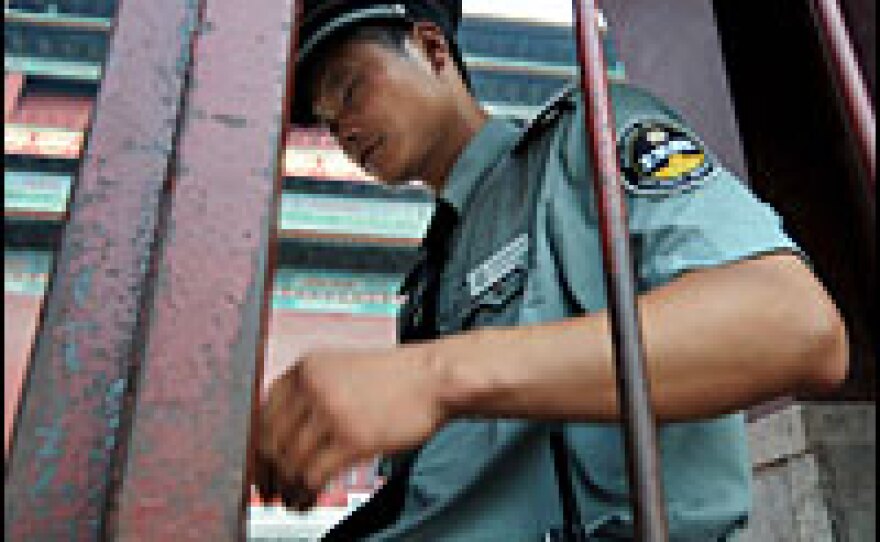
Beijing's Olympic dream was dented by security threats over the weekend: first by the murder of an American tourist in an apparently random act, then by a coordinated bomb attack in the northwest province of Xinjiang.
Beijing has put 110,000 police and 1.7 million volunteers on the streets, but some Olympic tourists are now reassessing their own safety.
Murder At The Drum Tower
Beijing's Drum Tower is an imposing, ancient, oxblood-red pagoda with green roofs and balconies decorated in gold. There, two days ago, a Chinese man attacked two American tourists. Todd Bachman, CEO of a Minneapolis-based chain of gardening centers, was killed; his wife, Barbara, was seriously injured and remains hospitalized. Their daughter Elisabeth Bachman, a former Olympian, is married to U.S. Olympic men's volleyball coach Hugh McCutcheon. Today, the Drum Tower is closed but still the tourists are flocking here.
Bicycle rickshaws take visitors on tours of the nearby alleyways. Like Chris Glancey from New Jersey, many tourists have a philosophical attitude toward the stabbing attack.
"You know, we have that in the U.S. all the time," Glancey says. "Apparently, it's a rarity here. So I don't feel any less safe here than I do in New York City."
Little Coverage In China
There has been little coverage in the local news and some visitors hadn't heard anything, like Karen Wiederholt from San Francisco, who is here with her two children.
"We feel totally safe," says Wiederholt, who had been unaware of the stabbings. "I guess hearing that news doesn't make me feel that good."
That information had apparently been kept from her by husband, Nick Driver, who admitted knowing both about the attack and about the bombings 1,700 miles away in Xinjiang. He wasn't worried, however, about his family's safety. Instead, he feared stepped-up security could take the fun out of the Olympics.
"It's very difficult for a lot of people to get visas," Driver says. "It's difficult for a lot of people to get access to the beautiful Olympic center if you don't have tickets. You just want to visit the Olympic park. That has the downside of spoiling some of the beauty of the Olympics for some people."
'Not Immune To Violent Acts'
Speaking on Sunday, Beijing Olympic official Wang Wei insisted security at the Olympic venues was adequate, but he said extra security checks might be added at scenic spots.
"Beijing is a safe city," Wang says, "but unfortunately we are not immune to violent acts."
There's certainly no lack of security at Tiananmen Square, the political and symbolic heart of Beijing. There are policemen every 30 paces and surveillance cameras on all the lampposts. There are also policemen patrolling the square. It seems their focus is on stopping protests.
"I think they're scared, so they're trying to use all the resources they've got to make people safe," says Alie Dupree of Montreal, who believes the show of force is a sign of insecurity rather than strength.
The motive for the attack on the tourists is still unknown, but some still believe Americans might be targeted. The Australian Olympic team's members have been ordered to wear their uniforms whenever they leave the Olympic park to distinguish them from Americans. Those thoughts also occurred to Dutch tourist Maaike Tuk.
"So we said we go dressed in orange, so they know we are not Americans," Tuk says with a laugh.
A big outdoor screen near to the Olympic venues in Beijing isn't playing any sound, because it seems the authorities are intent on avoiding large public gatherings for security purposes.
All around Beijing, these enormous public television screens have been turned off — even though that means not bringing the games to the people.
Copyright 2022 NPR. To see more, visit https://www.npr.org. 9(MDAzMjM2NDYzMDEyMzc1Njk5NjAxNzY3OQ001))







